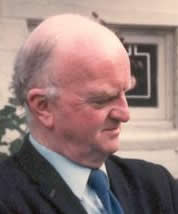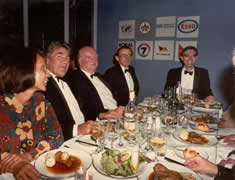
 |
Advisor to government - 'Fascinating intellectual cut and thrust'
Fitzgerald was given a broad brief to report on the question 'What is Australia getting from its mineral industry?' and left to get on with it by the Minister who advised 'I’ll leave it to you. It’s a hard one but you can do it.'
|
|||||||||||||||||||||||||||||
 |
Tom Fitzgerald in pensive mood, 1982 Image cropped from: John Curtin Prime Ministerial Library.
Records of the Fitzgerald family. Tom Fitzgerald and grandson David, 1982.
JCPML00720/47 |
||||||||||||||||||||||||||||
The paper became embroiled in controversy with Fitzgerald himself being 'about equally annoyed by the bitter opponents of the paper and its doughty champions.' Humphrey McQueen made the following assessment of the impact of the Fitzgerald Report:
|
|||||||||||||||||||||||||||||
 |
Left to right: Mrs Carr, Vincent Serventy, Tom Fitzgerald, Bob Carr and Nigel Stokes at a farewell dinner for Neville Wran in 1986 John Curtin Prime Ministerial Library. Records
of the Fitzgerald family. Mrs Carr, Vincent Serventy, Tom Fitzgerald,
Bob Carr, Nigel Stokes; farewell dinner for Neville Wran, 1986. JCPML00720/54 |
||||||||||||||||||||||||||||
|
Shortly after the release of the Report, Fitzgerald was approached to undertake further advisory work for government.
Footnotes1 - 2 John Curtin Prime Ministerial Library. Records of the National Library of Australia. Interview of Tom Fitzgerald, 01/02/1988 - 3/09/1988. JCPML00658/1. Original held by National Library of Australia TRC 2247 3. McQueen, Humphry, A human face of economics and an emperor of ice cream, 24 Hours, April 1993 4. John Curtin Prime Ministerial Library. Records of the National Library of Australia. Interview of Tom Fitzgerald, 01/02/1988 - 3/09/1988. JCPML00658/1. Original held by National Library of Australia TRC 2247
|
|||||||||||||||||||||||||||||